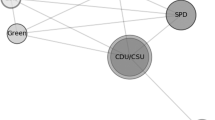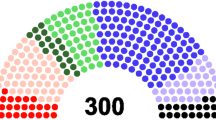Abstract
In this paper we study the distribution of power in the Basque Parliament since the restoration of the Spanish democracy. The classic simple games do not fit with the particular voting rule that it is used to invest the president of the regional government. In order to model this voting mechanism we incorporate coalitional externalities to the game. We use the extensions of the most popular power indices to games with externalities that have been proposed in the most recent literature. Moreover, we propose a method to estimate the probability of a given coalition based on the ideological positions of its members in a two-dimensional political spectrum.





Similar content being viewed by others
Notes
With the Maastricht Treaty, that is, before the enlargement to eastern Europe.
This index was actually first proposed by Penrose (1946) but it is most widely known after Banzhaf’s work.
Other institutions with similar investiture procedures in Spain are the Parliament of Asturias and the City Councils.
To be precise, we use their specification to simple games with externalities as defined in Alonso-Meijide et al. (2017a).
While the centre-periphery dimension is clearly referred to the nationalist issue, it is not so clear that the left-right dimension corresponds only with the economic issue, as some authors (Knutsen 1995; Van der Eijk et al. 2005) define this cleavage as a super-issue that includes several other dimensions such as the religious-secular issue or the materalist/post-materialist values.
We consider that the empty set is an element of every partition.
Where \({\mathbb {R}}_+=\{x\in {\mathbb {R}} : x\ge 0\)}
Index instead of value because we only apply it to simple games with externalities.
We refer to them as DP-Index and PG-Index.
In most axiomatic characterizations symmetry can be replaced by anonymity (a stronger property) that requires the power to be independent to the labeling of the players (see, for instance, Shapley 1953).
Or alternatively, weighted versions of the monotonicity property (Young 1985).
We have omitted the results of the 1980 election (the first after the Spanish transition to democracy) because the use of the plurality rule in the investiture procedure began in the 1984 election.
It is worth to point out that the normalized version of the Banzhaf index losses some important properties of the original index like the transfer property described in Sect. 2.4.
Please note that in this case we employ the notation P to refer to the probability that an event occurs, not to a partition of the player set N:
Given that we are working with differences between pairs, the sum of differences can only be maximum if \(N=2\).
Links to the studies: Study 1402 (1984), Study 1565 (1986), Study 1903 (1990), Study 2308 (1998), Study 2421 (2001), Study 2601 (2005), Study 2795 (2009), Study 2964 (2012), Study 3154 (2016). The studies can only be found in spanish.
The numerical results have been obtained using the software R. The routines developed are available upon request to the authors.
Two players are said to be symmetric in a game if swapping them does not change the worth of any (embedded) coalition.
In the case of this last one, because of the ban of HB first and EH later, it has been impossible to take one single party. We have chosen these four because of their common origins and shared membership (Calvo 2012).
In the second, fifth, sixth, ninth and tenth legislatures.
References
Albertos, J. F. (2002). Votar en dos dimensiones: el precio del nacionalismo y la ideología en el comportamiento electoral vasco, 1993–2001. Revista Española de Ciencia Política, 6, 153–181.
Alonso-Meijide, J. M., Álvarez-Mozos, M., & Fiestras-Janeiro, M. G. (2017a). Power indices and minimal winning coalitions for simple games in partition function form. Group Decision and Negotiation, 26(6), 1231–1245.
Alonso-Meijide, J. M., Álvarez-Mozos, M., Fiestras-Janeiro, M. G., & Jiménez-Losada, A. (2017b). Some structural properties of a lattice of embedded coalitions. International Journal of General Systems, 46(2), 123–143.
Alonso-Meijide, J. M., & Bowles, C. (2005). Generating functions for coalitional power indices: An application to the IMF. Annals of Operations Research, 137(1), 21–44.
Álvarez-Mozos, M., Alonso-Meijide, J. M., & Fiestras-Janeiro, M. G. (2017). On the externality-free Shapley-Shubik index. Games and Economic Behavior, 105, 148–154.
Álvarez-Mozos, M., & Tejada, O. (2015). The Banzhaf value in the presence of externalities. Social Choice and Welfare, 44, 781–805.
Ansolabehere, S., & Puy, M. (2015). Ideology, nationalism, and identity in Basque regional elections. Technical report, Universidad de Málaga, Department of Economic Theory, Málaga Economic Theory Research Center.
Arévalo-Iglesias, G. (2018). Values for games with externalities. Master’s thesis, University of Santiago de Compostela.
Banzhaf, J. F. (1964). Weighted voting doesn’t work: A mathematical analysis. Rutgers Law Review, 19, 317.
Calvo, R. L. (2012). Izquierda abertzale: De la heterogeneidad al monolitismo. In Coetánea: III Congreso Internacional de Historia de Nuestro Tiempo, pages 377–388. Universidad de La Rioja.
Casajus, A. (2012). Amalgamating players, symmetry, and the Banzhaf value. International Journal of Game Theory, 41(3), 497–515.
de Clippel, G., & Serrano, R. (2008). Marginal contributions and externalities in the value. Econometrica, 76(6), 1413–1436.
De la Calle Robles, L. (2005). Cuando la proximidad deja de ser importante: modelos espaciales y voto en la política vasca (1994–2001). Revista Española de Ciencia Política, 12, 21–52.
Deegan, J., & Packel, E. (1978). A new index of power for simple \(n\)-person games. International Journal of Game Theory, 7(2), 113–123.
Dubey, P. (1975). On the uniqueness of the Shapley value. International Journal of Game Theory, 4(3), 131–139.
Dubey, P., & Shapley, L. S. (1979). Mathematical properties of the Banzhaf power index. Mathematics of Operations Research, 4(2), 99–131.
Gillespie, R. (2000). Political polarization in the Basque Country. Regional and Federal Studies, 10(1), 112–124.
Haller, H. (1994). Collusion properties of values. International Journal of Game Theory, 23(3), 261–281.
Holler, M. J. (1982). Forming coalitions and measuring voting power. Political Studies, 30(2), 262–271.
Holler, M. J., & Packel, E. W. (1983). Power, luck and the right index. Journal of Economics, 43, 21–29.
Huber, G., Kocher, M., & Sutter, M. (2003). Government strength, power dispersion in governments and budget deficits in OECD-countries. A voting power approach. Public Choice, 116(3–4), 333–350.
Knutsen, O. (1995). Value orientations, political conflicts and left-right identification: A comparative study. European Journal of Political Research, 28(1), 63–93.
Laruelle, A., & Widgrén, M. (1998). Is the allocation of voting power among EU states fair? Public Choice, 94(3–4), 317–339.
Leonisio, R. (2012). Parliament on the centre-right, government on the left: Explaining Basque exceptionalism. Regional and Federal Studies, 22(1), 45–60.
Leonisio, R., & Strijbis, O. (2014). Beyond self-placement: Why nationalism is a better predictor of electoral behaviour in the Basque Country. Revista Española de Investigaciones Sociológicas, 146, 47–68.
Macho-Stadler, I., Pérez-Castrillo, D., & Wettstein, D. (2007). Sharing the surplus: an extension of the Shapley value for environments with externalities. Journal of Economic Theory, 135(1), 339–356.
Maskin, E. (2016). How can cooperative game theory be made more relevant to economics?: An open problem. Open problems in mathematics (pp. 347–350). Berlin: Springer.
Penrose, L. S. (1946). The elementary statistics of majority voting. Journal of the Royal Statistical Society, 109(1), 53–57.
Shapley, L. S. (1953). A value for n-person games. In A. W. Tucker (Ed.), Contributions to the Theory of Games II (pp. 307–317). Princeton: Princeton University Press.
Shapley, L. S., & Shubik, M. (1954). A method for evaluating the distribution of power in a committee system. American Political Science Review, 48(3), 787–792.
Straffin, P. D. (1988). The Shapley–Shubik and Banzhaf power indices as probabilities. In A. E. Roth (Ed.), The Shapley value. Essays in honor of Lloyd S. Shapley (pp. 71–81). Cambridge: Cambridge University Press.
Thrall, R., & Lucas, W. (1963). n-person games in partition function form. Naval Research Logistics Quarterly, 10(1), 281–298.
Van der Eijk, C., Schmitt, H., & Binder, T. (2005). Left-right orientations and party choice. The European Voter (pp. 167–191). Oxford: Oxford University Press.
Young, H. P. (1985). Monotonic solutions of cooperative games. International Journal of Game Theory, 14(2), 65–72.
Acknowledgements
The second author acknowledges the support from the European Regional Development Fund (ERDF) and Ministerio de Economía, Industria y Competitividad through Grant ECO2017-86481-P and from Generalitat de Catalunya through Grant 2017-SGR-778.
Author information
Authors and Affiliations
Corresponding author
Additional information
Publisher's Note
Springer Nature remains neutral with regard to jurisdictional claims in published maps and institutional affiliations.
Rights and permissions
About this article
Cite this article
Arévalo-Iglesias, G., Álvarez-Mozos, M. Power distribution in the Basque Parliament using games with externalities. Theory Decis 89, 157–178 (2020). https://doi.org/10.1007/s11238-020-09748-2
Published:
Issue Date:
DOI: https://doi.org/10.1007/s11238-020-09748-2




